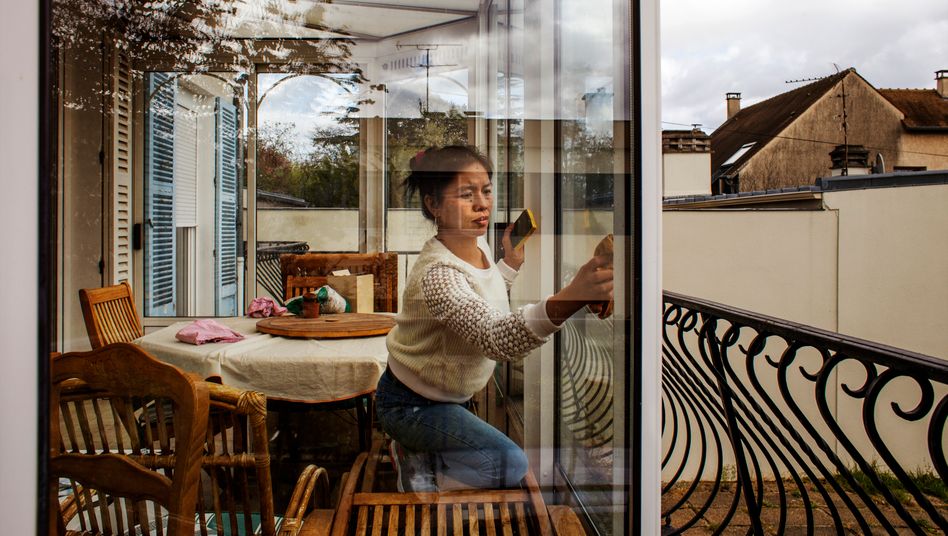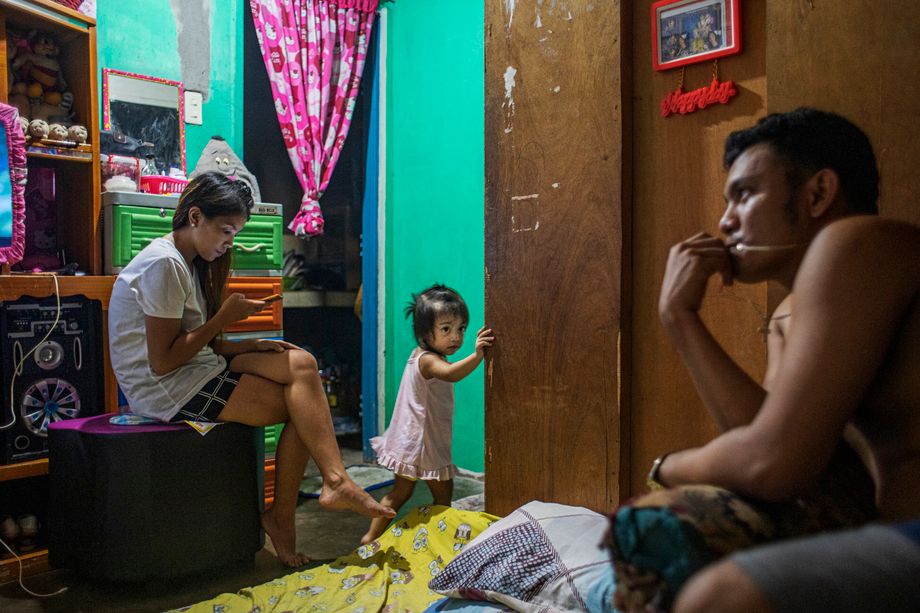www.aljazeerah.info
News, January 2020
Archives
Mission & Name
Conflict Terminology
Editorials
Gaza Holocaust
Gulf War
Isdood
Islam
News
News Photos
Opinion Editorials
US Foreign Policy (Dr. El-Najjar's Articles)
www.aljazeerah.info
|
Editorial Note: The following news reports are summaries from original sources. They may also include corrections of Arabic names and political terminology. Comments are in parentheses. |
3 Europe's Army of Filipino Domestic Workers
Der Spiegel, January 14, 2020
By Maria Stöhr and Thomas Morel-Fort (Photos) 14.01.2021, 13.33 Uhr
 |
 |
| Jhen, a Filipino domestic servants cleaning an apartment window in Paris, January 14, 2021 | Jhen's family in the Philippines, January 14, 2021 |
They clean, walk dogs and take care of children, day in and day out, for years at a time. A photography project shows how women from the Philippines work in poor conditions in Europe so that their families back home can have better lives.
For our Global Societies project, reporters around the world will be writing about societal problems, sustainability and development in Asia, Africa, Latin America and Europe. The series will include features, analyses, photo essays, videos and podcasts looking behind the curtain of globalization. The project is generously funded by the Bill & Melinda Gates Foundation.
This is a story of rich and poor in close quarters. And it is one in which France and the Philippines, which are otherwise separated by 11,000 kilometers and two continents, are likewise close together.
It is the story of Donna and Jhen, two women from a poor area near the Philippine capital city of Manila who have been living in Paris for years, fluffing the pillows of the rich. They asked that we not use their last names. It is also a story of photographer Thomas Morel-Fort, who frequently crossed paths with the women in his neighborhood, until he finally approached Donna and Jhen and listened to their stories.
He learned that one of the Philippines’ most-exported commodities is women’s labor. Indeed, the majority of people who move abroad from the Philippines are women, and before the coronavirus struck, thousands of them were leaving home each month. They traveled to faraway places to work as cleaners, nannies or cooks for the rich in places as far-flung as Singapore, Kuwait and Paris. The remittances they send home each month keep their families afloat.
A Filipino domestic worker washes dishes on board a barge along the Seine River in Paris.
Foto:
Thomas Morel-Fort
Donna starts work early in the morning and continues until late evening. She cleans the windows for wealthy families, makes sure refrigerators are full, that the kids are in diapers and the dogs have been taken for walks. She is paid irregularly and lives on friends’ sofas because she can't afford rent in expensive Paris. If they work every day, the women earn between 1,500 and 2,000 euros a month, the photographer says.
ANZEIGE Mike Pence lehnt Absetzung von US-Präsident Donald Trump ab Ein Angebot von
Jhen irons laundry at luxury hotels in Paris and is often booked to clean apartments rented on Airbnb. But she has lost a lot of business since the arrival of the coronavirus and the collapse of tourism in the city.
The burden these women carry is enormous, says Morel-Fort. He says they are driven by the desire to give their children a better life so that they can be educated and find good employment.
Jhen's family in the Philippines: Several families live from the money that Donna and Jhen regularly wire back home.
Foto: Thomas Morel-Fort / Thomas-Morel-Fort
Ironically, it is the very jobs that have kept women down and destitute for centuries – housekeeping, caring for children and cooking – that are now empowering Filipino women to lift, if not themselves, then at least the next generation out of poverty.
Family Life as a Shaky WhatsApp Connection
Take Nicole, Donna's daughter, for example. Thanks to her mother’s money, she was able to finish college and train as a nurse, thus fulfilling the dream Donna once had for herself: to work in a hospital. Or Ron, Jhen’s son. He attended an expensive private school, financed by the wages his mother earned cleaning.
Photographer Morel-Fort says families back at home often lack understanding of the hardships these women face in Europe. There is a prevailing prejudice that any life in Europe is better than life in the Philippines.
Greetings from back home: Jhen's daughter Jennidel (right) and her aunt telephone with Jhen in Paris.
Foto: Thomas Morel-Fort / Thomas-Morel-Fort
That, though, isn't always true. Donna and Jhen live in France illegally, which means they have no rights and are dependent on their clients. For years, they have only seen or heard from their children in photos and through internet phone calls – family life as a shaky WhatsApp connection.
There are stories of employers who take away the women’s passports so they can’t run away, of physical violence and blackmail. And they are frequently accused of transgressions like stealing food, mobile phones or money.
Morel-Fort spent years building trust with Donna and Jhen. At one point, he even went undercover to get a job with Donna’s clients in order to research working conditions. "We didn’t have a minute to ourselves,” he says of the time. "We worked hard, slept, and then started working again.” He says there wasn’t even a day’s rest. On one occasion, the employer was unhappy with the color of the water in the swimming pool, so they had to drain the pool and spend all night cleaning it.
A rare moment of peace and quiet: Donna, Jhen and another friend meet up during the evening. The Filipino community in Paris is large.
Foto: Thomas Morel-Fort
Then, in summer 2019, the photographer traveled to visit Donna’s and Jhen’s families in the Philippines. He made the trip that Donna and Jhen have been longing to take for years. While he was there, he met two large families who are all dependent on the wages of women in Europe.
Morel-Fort was there for Nicole’s graduation party, and he took photos as she received her nursing diploma on stage. "When I gave Donna the photos back in Paris, she looked happier than ever,” the photojournalist says.
Europe's Army of Filipino Domestic Workers: Modern Slavery - DER SPIEGEL
***
Share the link of this article with your facebook friendsFair Use Notice
This site contains copyrighted material the
use of which has not always been specifically authorized by the copyright
owner. We are making such material available in our efforts to advance
understanding of environmental, political, human rights, economic,
democracy, scientific, and social justice issues, etc. We believe this
constitutes a 'fair use' of any such copyrighted material as provided for
in section 107 of the US Copyright Law. In accordance with Title 17 U.S.C.
Section 107, the material on this site is
distributed without profit to those
who have expressed a prior interest in receiving the included information
for research and educational purposes. For more information go to: http://www.law.cornell.edu/uscode/17/107.shtml.
If you wish to use copyrighted material from this site for purposes of
your own that go beyond 'fair use', you must obtain permission from the
copyright owner.
|
|
|
|
||
|
||||||


